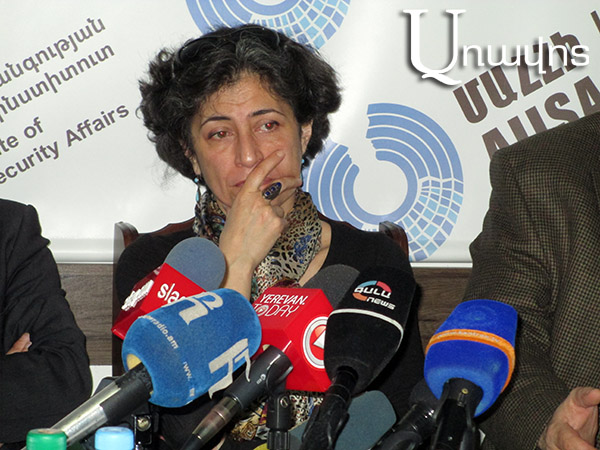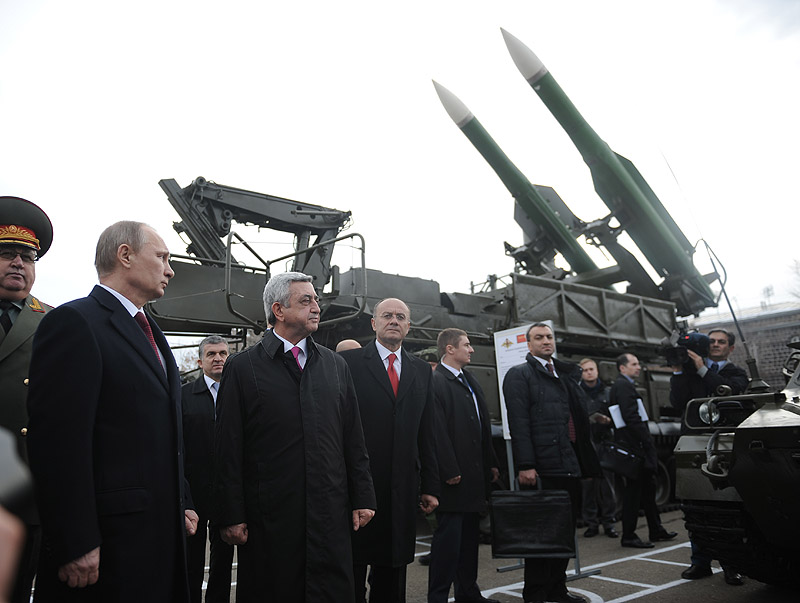Our interlocutor is Marta Ayvazyan, expert at the Armenian Center for Democracy, Security and Development
– How would you describe the year of 2014 for Armenia? What achievements and losses did we have in foreign relations? What are Armenia’s chances since 2015 already as EaEU member state? Shall we manage to maneuver in foreign relations?
– I would describe Armenia in 2014, generally, as a year of lack of foreign policy and foreign relations. What happened in 2014, it was the continuation of the processes mainly due to the decision announced on September 3, last year, the deepening of the negative effects of this decision, and the affirmation of Armenia’s status at the international arena as Russia’s puppet state.
This reality is manifested by the results of voting for the resolution presented by Ukraine at the UN General Assembly meeting with regard to referendum held in the Crimea and territorial integrity of Ukraine, and in general, Armenia’s position, or rather to say, its absence about Ukrainian crisis and Russia’s role in it. The same thing applies to Armenia’s absolute inaction to supply of several billion dollars worth of weapons to Azerbaijan by Russia and so on. The only exception was Serzh Sargsyan’s attendance to the NATO summit, which in the current situation and despite the motives was in favor of Armenia. What refers to possibilities of maneuvering in foreign relations after 2015, already as an EaEU member state, then, of course, they are very limited, but nevertheless, they exist even in case of joining the EaEU.
Read also
However, to use these opportunities, Armenia’s government authorities should be guided by the public interest and, if necessary, to be able to counter Russia, to protect the interests of Armenia, if necessary, opposing the Russian Federation, which is possible only in the event of neutralizing Russia’s influence leverages constituting a part of Armenia’s political field and under respective systemic changes in Armenia.
– Given the financial-economic situation in Russia as a result of Western sanctions, what do you think, can the EaEU viability be a guarantee in such a situation, and in general, what is expected of Russia?
– Russia’s economic situation, certainly, is very important for the formation of the EaEU, but in my opinion, the viability of this structure is under question, not so much because of the current financial-economic crisis in Russia, as particularly because of under those conditions and at this point, the disconformity of economic and political interests of its member states, the current tense relations between them and Russia’s disproportionate political and economic ambitions with its capability and capacity, the policy targeted at using the organization exclusively for its interests and the on-going confrontation with the West. As for Russia, 70 percent of raw materials and, in particular, depending on export of oil and gas, backward from the prospect of technology, often, sharp decline in oil prices under the economy depending on import to meet the domestic demand for food, a decline that is associated with financial-economic sanctions applied by Western countries and conditioned by various factors, the unprecedented devaluation of the ruble, together with enormous amounts spent for the activities going on in the Crimea and Ukraine, today, brought Russia to the edge of default.
The domestic socio-economic tension is increasingly growing, too. Russia’s all attempts to partly supplement its losses due to deepening of economic relation with Asian countries, particularly China, so far did not produce any results. Moreover, the conditions dictated by Asian countries, generally, question the advantageousness of development of cooperation for Russia. Given that no rise in oil prices is expected in the near future, and raising its own economy back on its feet and making it self-sufficient requires years and financial resources, and currently, to avoid default, as well as deepening of the economic crisis threatening by the wave of internal social discontent, Russia should manage to reach to easing of sanctions, which in its turn is possible only in case of Russia’s change of policy towards Ukraine. If Russia’s government authorities do not agree to compromise on this issue, the situation may lead to not only economic and social but also political shocks and even regime change.
– Russia does not rule out the possibility that within the Customs Union there might be a necessity to counter the Western sanctions against Russia, recently announced Russian Foreign Minister Sergei Lavrov. If this issue indeed becomes an agenda item for official Russia, how should Armenia behave itself? Shall we be able to withstand the possible pressures?
– I do not think that such a decision may be made by the CU, as it would be contrary to the interests of Russia, Belarus and Kazakhstan. The negative effects of Russia’s efforts to counter the Western sanctions by sanctions are obvious for Russia’s economy. Throughout the year, we have also seen how Belarus and Kazakhstan oppose Russia on different occasions and defend their interests, even threatening to withdraw from already existing Customs Union.
Let me remind you also that already with many different reasons, however, in reality, conditioned by Russia-West economic sanctions, the import for some types of goods from Belarus to Russia and vice versa is suspended. Lately, Belarus restored the customs checkpoints on the border with Russia. So, as I mentioned, in the event of existing ratio of contradictions and votes within the CU, such decision is considered unlikely to me. The picture could be changed in case of Armenia’s accession to the EaEU, which would enable Russians to use Armenia’s vote in favor of its interests. Belarus and Kazakhstan clearly understand it, and to avoid such situations, they actually failed the possibility of Armenia’s accession to the EaEU after January 1.
– Given the West-Russia confrontation in the context of Ukrainian events, the efforts of preserving the influence on the post-Soviet countries by Russia, can we state that by and large, the EU policy towards Russia has defeated?
– If we view the EU policy towards Russia as an EU tolerance to Russia’s activities aimed at preservation of influence over post-Soviet countries continuously and by all possible and also unacceptable means and anti-democratic developments in Russia dictated by narrow economic interests, then, yes, it failed. However, in the long run, for this moment, I would state not a failure of EU led policy over Russia, but a failure of foreign policy led by Russia’s current government authorities, and not only from the perspective of preservation of influence on the post-Soviet countries, but also at the international platform, Russia’s as one of the world strength and economic centers to be established by its ambitions and efforts. Russia, despite all its steps taken, was unable to suspend the signing of the EU Association Agreement by Georgia, Moldova and Ukraine, in particular. The President of Belarus also acted in favor of deepening of partnership with EU, which received a positive response from Brussels.
Moreover, Russia’s aggressive policy led by violation of fundamental norms of international law, namely, the annexation of Crimea, resulted in the fact that today, Russia is perceived by the international community as a threat to international peace and security, as an unpredictable and unreliable state. As a result of such developments, Russia was exposed to international economic sanctions. NATO urgently passed the final decisions on quick response forces and deployment of anti-missile defense system in Eastern Europe. Today, Ukraine, in its turn, is considering the issue of abandoning its status of not-joining the military alliance, as well as the prospects of joining NATO, which previously was not spoken about. The failure of Russia’s foreign policy is evidenced by the visits of Russia’s top leadership, which cannot be considered success ones, both procedurally and contextually.
– During Georgian Prime Minister’s August visit to Yerevan and Armenian Prime Minister’s recent visit to Tbilisi, it was mentioned that Armenia’s accession to the EaEU in no way would affect the existing economic relations with Georgia. Do you see opportunities of calling such persuasions into life?
– In the event of the EaEU membership, our economic relations with Georgia would be moved to multilateral format from being bilateral and would proceed in accordance with the EaEU defined terms and adopted normative acts. For us, this situation would have its negative impact at least on the goods imported to and exported from Armenia, on the mode and conditions of import of good directly from Georgia and transition through the territory of Georgia. It is also obvious that Russia would try using the EaEU as an additional lever of exerting pressure on Georgia.
Under these conditions, we can only hope that Armenia would not have to make such steps by once again subordinating its interests to Russia’s interests, which would negatively affect our relations with Georgia. The economic relations with Georgia, as well as our other immediate neighbors are vital for Armenia, and they obviously should not be driven by the interests of the third countries, moreover, be dictated by them. This refers to Georgia, Iran and Turkey, and it is important not only in terms of regional economic development prospects, but also ensuring protection of Armenia’s political interests and economic security and stability.
Emma GABRIELYAN























































